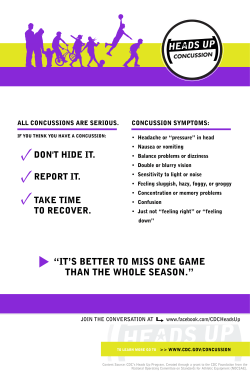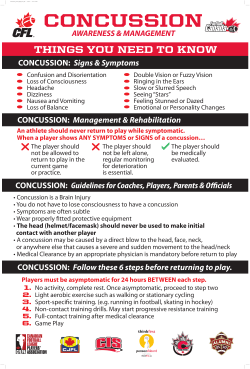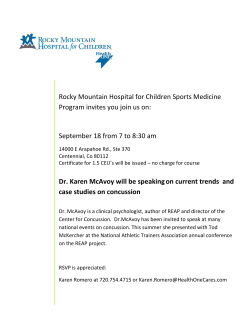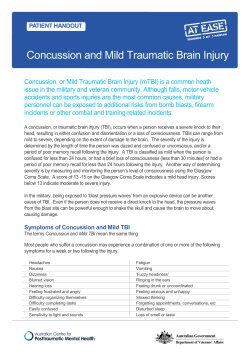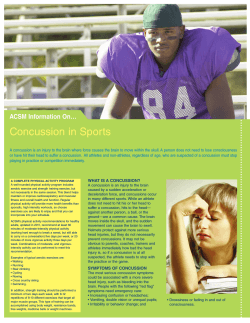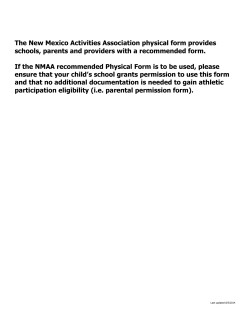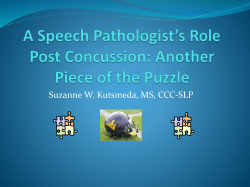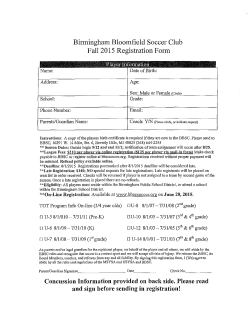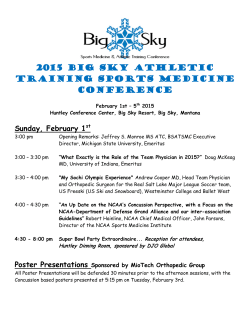
Young Lady Cougar Girls Basketball 2014-15
Young Lady Cougar Girls Basketball 2014-2015 Young Lady Cougar basketball is a league for West Olympia area girls in grades 3-6. The emphasis is on sportsmanship, having fun, and allowing all to participate. Our goal is to give our future CHS Cougars a chance to learn basketball fundamentals and develop skills through practice and games. Every girl will receive a Little Cougar T-shirt, a basketball, instruction at weekly practices, and lots of encouragement. Please join us and become part of a proud Cougar basketball tradition! REGISTRATION: Saturday, October 25th from 9-noon and Saturday, November 8th from 9-noon at Capital High School commons. *After November 8th, registration forms must be taken to the ASB window at CHS during school hours or may be mailed. CLINIC: Saturday, November 22nd 11:15 a.m.-12:30 p.m. (at Capital High School gym. *This is when the girls will meet their coaches and teammates, receive schedules, and learn a lot about Cougar basketball. GAMES: All games will be on Saturday afternoons at Capital High School gyms. Games will be Dec. 6, 13, 20, Jan. 10, 17, 24, 31, Feb. 7. PRACTICES: Practices will be one night a week, either Monday or Wednesday evenings, at west side elementary and middle schools. *Exact times and locations TBA. FEE: $100.00 per person, $180.00 for 2 players, and $250.00 for 3 players signing up together or in the same family. Please make checks payable to Capital High School ASB. QUESTIONS: If you have any questions, please contact Colleen Wells at cwells@osd.wednet.edu or Mark Mansfield at mmansfield@osd.wednet.edu. This is NOT a school-sponsored activity. The Olympia School District has neither reviewed nor approved the sponsoring organization or its program, personnel, and activities announced in this flier. The sponsoring organization and participants agree to protect, indemnify, and hold harmless the District, its board of directors, employees, and agents, from any and all claims, liabilities, damages, expenses or rights of action, directly or indirectly attributed to the organization, or its program, personnel, and activities. Permission to distribute this flier should not be considered an endorsement or recommendation of the program by the District. ****************************************************************************** REGISTRATION FORM NAME: _____________________________________ SCHOOL: _______________________ GRADE: _______ MAILING ADDRESS: _________________________________________________________________________ PARENT/GUARDIAN NAME: __________________________________________PHONE: _________________ EMAIL: ________________________________________________________CELL PHONE__________________ T-SHIRT SIZE: (circle one) Adult Lg. Adult Med. Adult Sm. Youth Lg. Youth Med. Youth Sm. TEAM/ SCHEDULING REQUESTS ______________________________________________________________ PAYMENT METHOD: ______ CASH OR ________CHECK - CHECK NUMBER _______________ Parent or Guardian Signature_______________________________________________ Date ________________ RELEASE OF LIABILITY I agree to hold harmless and indemnify Young Lady Cougar Basketball from all claims that might be filed against Capital High School Basketball, Capital High School, or Olympia School District, its hired or contracted employees, instructors, officials, or agents, for any and all injuries or losses that may be suffered because of my or my children’s participation in the above activity. I consent to my child’s participation in the activity/program, Young Lady Cougar or Little Cougar basketball, and authorize YLC or LC and its employees or agents to provide emergency medical treatment for my child on my behalf. To the best of my knowledge, my child has no physical or other condition(s), which would interfere with his/her participation. ________________________________________ Name of participant ________________________________ Age/Grade __________________________________________ Signature of parent/legal guardian ________________________________ Date CONCUSSION AND HEAD INJURY ACKNOWLEDGEMENT The purpose of this acknowledgement form is to confirm that you have read and understand the information provided you related to potential concussions and head injuries occurring during participation in athletic programs. I, ___________________________________________ as a student at ___________________________________ (Please print participant’s name) (School) and I, ___________________________________________ as a parent/legal guardian of the above named (Please print parent/guardian’s name) student, have read the informational material provided to us by the Olympia School District related to concussions and head injuries occurring during participation in athletic programs and understand its contents and warnings. ________________________________________ Signature of participant ________________________________ Date __________________________________________ Signature of parent/legal guardian ________________________________ Date HEADS UP: CONCUSSION IN YOUTH SPORTS A Fact Sheet for PARENTS WHAT IS A CONCUSSION? A concussion is a brain injury. Concussions are caused by a bump or blow to the head. Even a “ding,” “getting your bell rung,” or what seems to be a mild bump or blow to the head can be serious. You can’t see a concussion. Signs and symptoms of concussion can show up right after the injury or may not appear or be noticed until days or weeks after the injury. If your child reports any symptoms of concussion, or if you notice the symptoms yourself, seek medical attention right away. WHAT ARE THE SIGNS AND SYMPTOMS OF A CONCUSSION? Signs Observed by Parents or Guardians If your child has experienced a bump or blow to the head during a game or practice, look for any of the following signs and symptoms of a concussion: • Appears dazed or stunned • Is confused about assignment or position • Forgets an instruction • Is unsure of game, score, or opponent • Moves clumsily • Answers questions slowly • Loses consciousness (even briefly) • Shows behavior or personality changes • Can’t recall events prior to hit or fall • Can’t recall events after hit or fall Symptoms Reported by Athlete • Headache or “pressure” in head • Nausea or vomiting • Balance problems or dizziness • Double or blurry vision • Sensitivity to light • Sensitivity to noise • Feeling sluggish, hazy, foggy, or groggy • Concentration or memory problems • Confusion • Does not “feel right” HOW CAN YOU HELP YOUR CHILD PREVENT A CONCUSSION? Every sport is different, but there are steps your children can take to protect themselves from concussion. • Ensure that they follow their coach’s rules for safety and the rules of the sport. • Encourage them to practice good sportsmanship at all times. • Make sure they wear the right protective equipment for their activity (such as helmets, padding, shin guards, and eye and mouth guards). Protective equipment should fit properly, be well maintained, and be worn consistently and correctly. • Learn the signs and symptoms of a concussion. WHAT SHOULD YOU DO IF YOU THINK YOUR CHILD HAS A CONCUSSION? 1. Seek medical attention right away. A health care professional will be able to decide how serious the concussion is and when it is safe for your child to return to sports. 2. Keep your child out of play. Concussions take time to heal. Don’t let your child return to play until a health care professional says it’s OK. Children who return to play too soon—while the brain is still healing—risk a greater chance of having a second concussion. Second or later concussions can be very serious. They can cause permanent brain damage, affecting your child for a lifetime. 3. Tell your child’s coach about any recent concussion. Coaches should know if your child had a recent concussion in ANY sport. Your child’s coach may not know about a concussion your child received in another sport or activity unless you tell the coach. A Fact Sheet for ATHLETES WHAT IS A CONCUSSION? A concussion is a brain injury that: • Is caused by a bump or blow to the head • Can change the way your brain normally works • Can occur during practices or games in any sport • Can happen even if you haven’t been knocked out • Can be serious even if you’ve just been “dinged” WHAT ARE THE SYMPTOMS OF A CONCUSSION? • Headache or “pressure” in head • Nausea or vomiting • Balance problems or dizziness • Double or blurry vision • Bothered by light • Bothered by noise • Feeling sluggish, hazy, foggy, or groggy • Difficulty paying attention • Memory problems • Confusion • Does not “feel right” WHAT SHOULD I DO IF I THINK I HAVE A CONCUSSION? • Tell your coaches and your parents. Never ignore a bump or blow to the head even if you feel fine. Also, tell your coach if one of your teammates might have a concussion. • Get a medical check up. A doctor or health care professional can tell you if you have a concussion and when you are OK to return to play. • Give yourself time to get better. If you have had a concussion, your brain needs time to heal. While your brain is still healing, you are much more likely to have a second concussion. Second or later concussions can cause damage to your brain. It is important to rest until you get approval from a doctor or health care professional to return to play. • HOW CAN I PREVENT A CONCUSSION? Every sport is different, but there are steps you can take to protect yourself. • Follow your coach’s rules for safety and the rules of the sport. • Practice good sportsmanship at all times. • Use the proper sports equipment, including personal protective equipment (such as helmets, padding, shin guards, and eye and mouth guards). In order for equipment to protect you, it must be: o The right equipment for the game, position, or activity o Worn correctly and fit well o Used every time you play It’s better to miss one game than the whole season. Content Source: National Center for Injury Prevention and Control, Division of Injury Response Page last modified: August 31, 2009 http://www.cdc.gov/concussioninyouthsports
© Copyright 2025
